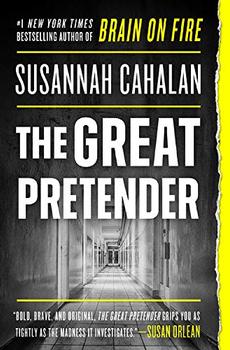Reading Guide Questions

Please be aware that this discussion guide will contain spoilers!
- Discuss the book's title. Does the term "the great pretender" change meaning for you over the course of the book, and if so,how? What different things does it represent to you by the end of the book versus the beginning?
- In chapter 1, Susannah encounters a woman whose disease was similar to her own, but her fate was drastically different. She begins to refer to her as her "mirror image." How does this figure—and the author's awareness of her background presence—help shape the rest of the book? What would such a person look like in your own life?
- Why do you think "On Being Sane in Insane Places" hit such a nerve in American culture in 1973, and caused such a sea change in the history of psychiatry? How was it different from the work done by Nellie Bly and other brave pseudopatients and reporters in previous decades?
- Try to imagine what mental health care in this country would look like now if Rosenhan had never published his work. Would we be in a better place? A worse one? Why?
- Dr. Levy described Susannah as a ninth pseudopatient. In what ways do you feel that Susannah fills this role in the book?
- The central mystery of the book propels Susannah down a number of rabbit holes, and to a frustrating series of dead-ends, before she discovers the truth. Once she does, she realizes that the answer has been staring her in the face the whole time. How did you feel about this revelation? Have you had any experiences in your own life that have been similarly surprising?
- From the beginning, psychiatry has struggled with identifying the divide between the body and the mind, between the biological and the psychological, between the "real" and the idea that something is "all in your head." Do you agree that this line needs to be drawn, and if so, where would you draw it and why? Is there a better system of diagnosis than the one we have currently?
- If you had to write policy for revamping the mental healthcare system in this country, what would you tackle first? What approach do you feel is the most likely to succeed long-term?
- What was the most exciting, dramatic twist, or piece of evidence, that stuck with you over the course of the book?
- Susannah describes herself as in awe of Dr. Rosenhan, early in the book, and her drive to understand his study is fueled by her admiration for him; his students frequently describe him as "charismatic" and "charming." But of course,the secrets she uncovers considerably complicate her—and our—portrait of him as a man and a scientist. Have you had any experiences in your own personal or professional life with the fall of a hero, someone you admired who, in one way or another, failed to live up to your expectations? Discuss.
- If you were Rosenhan's student and he recruited you to participate as a pseudopatient in the study, would you have done it? Why or why not?
Unless otherwise stated, this discussion guide is reprinted with the permission of Grand Central Publishing.
Any page references refer to a USA edition of the book, usually the trade paperback version, and may vary in other editions.






